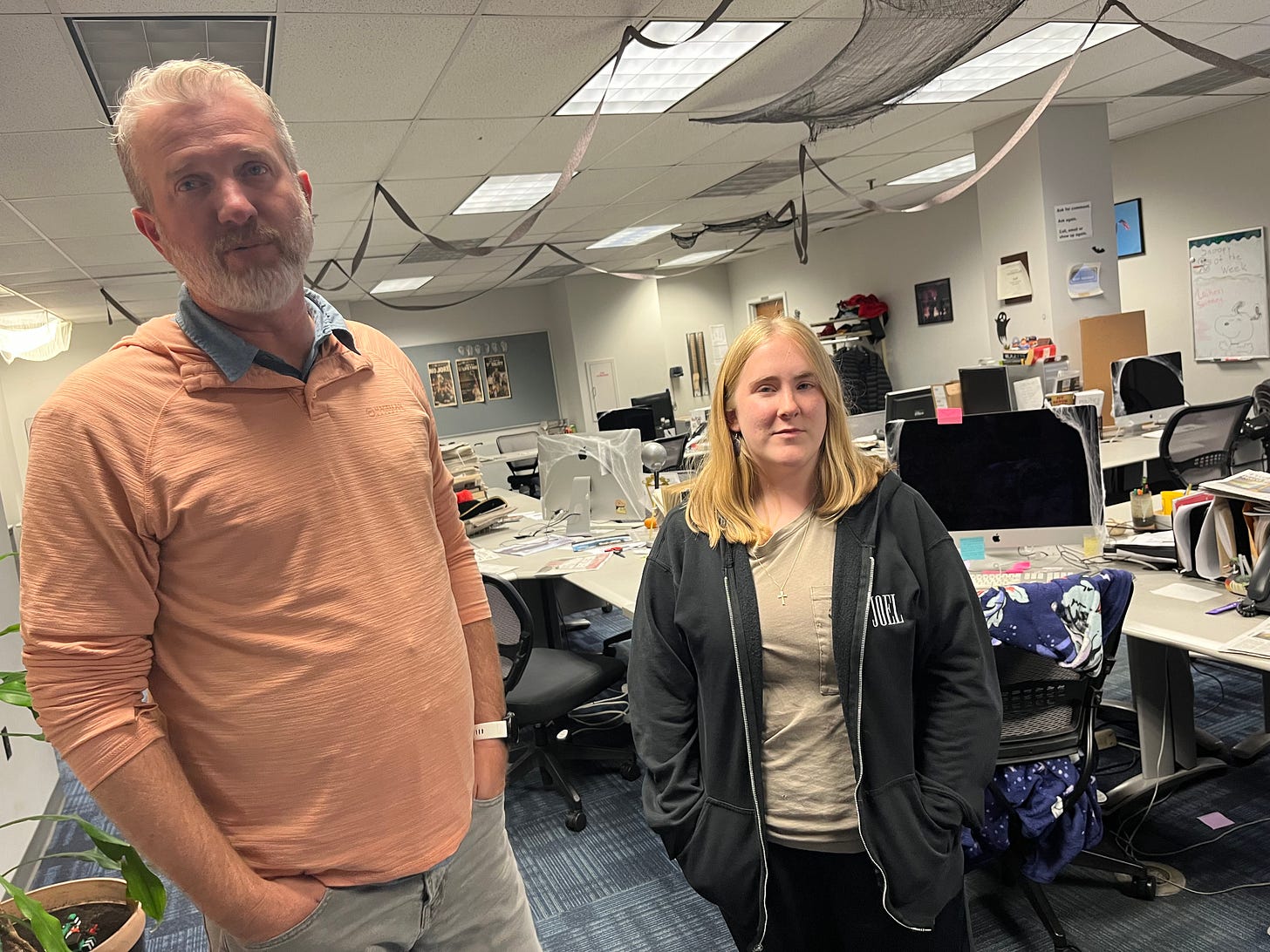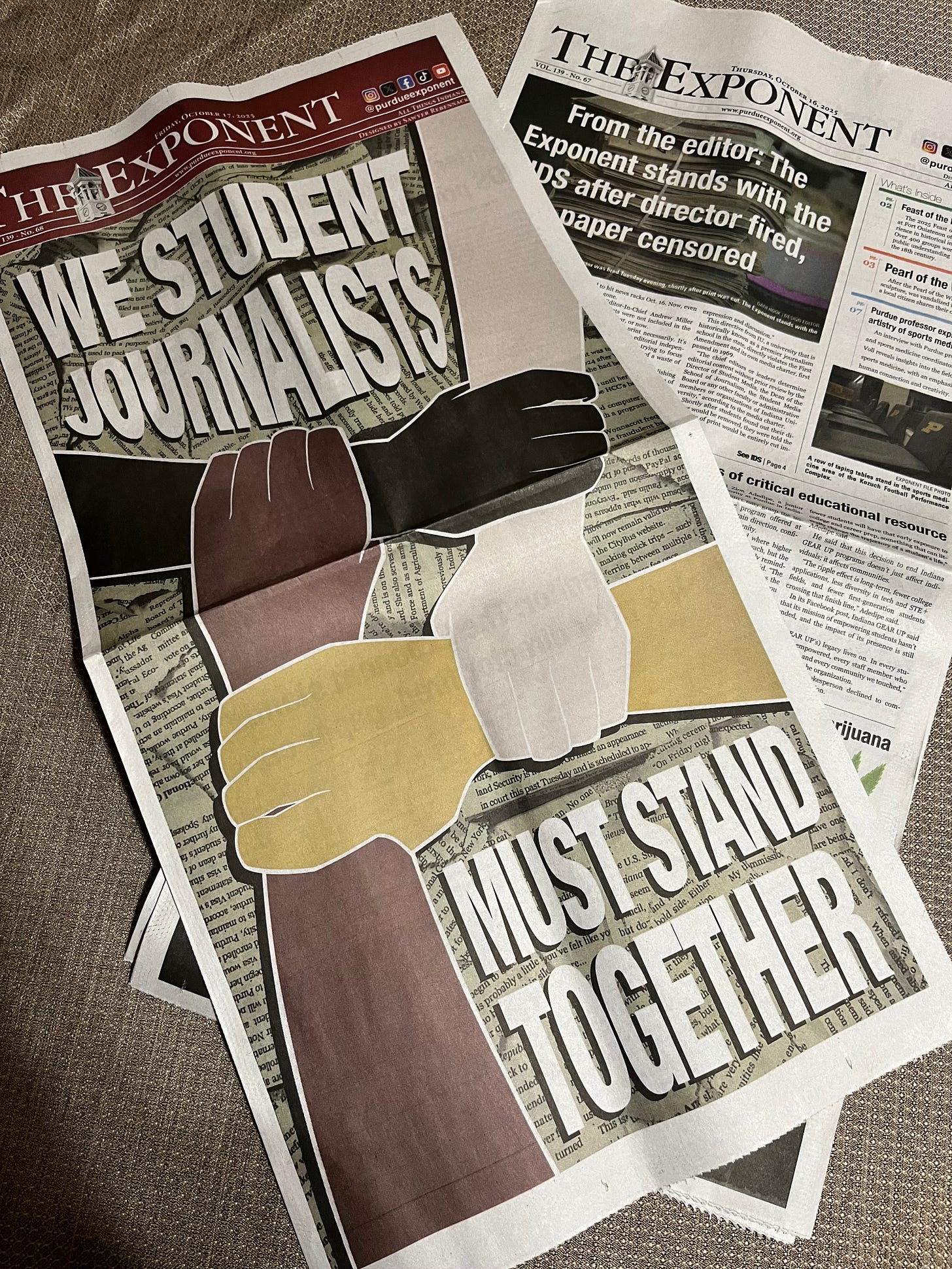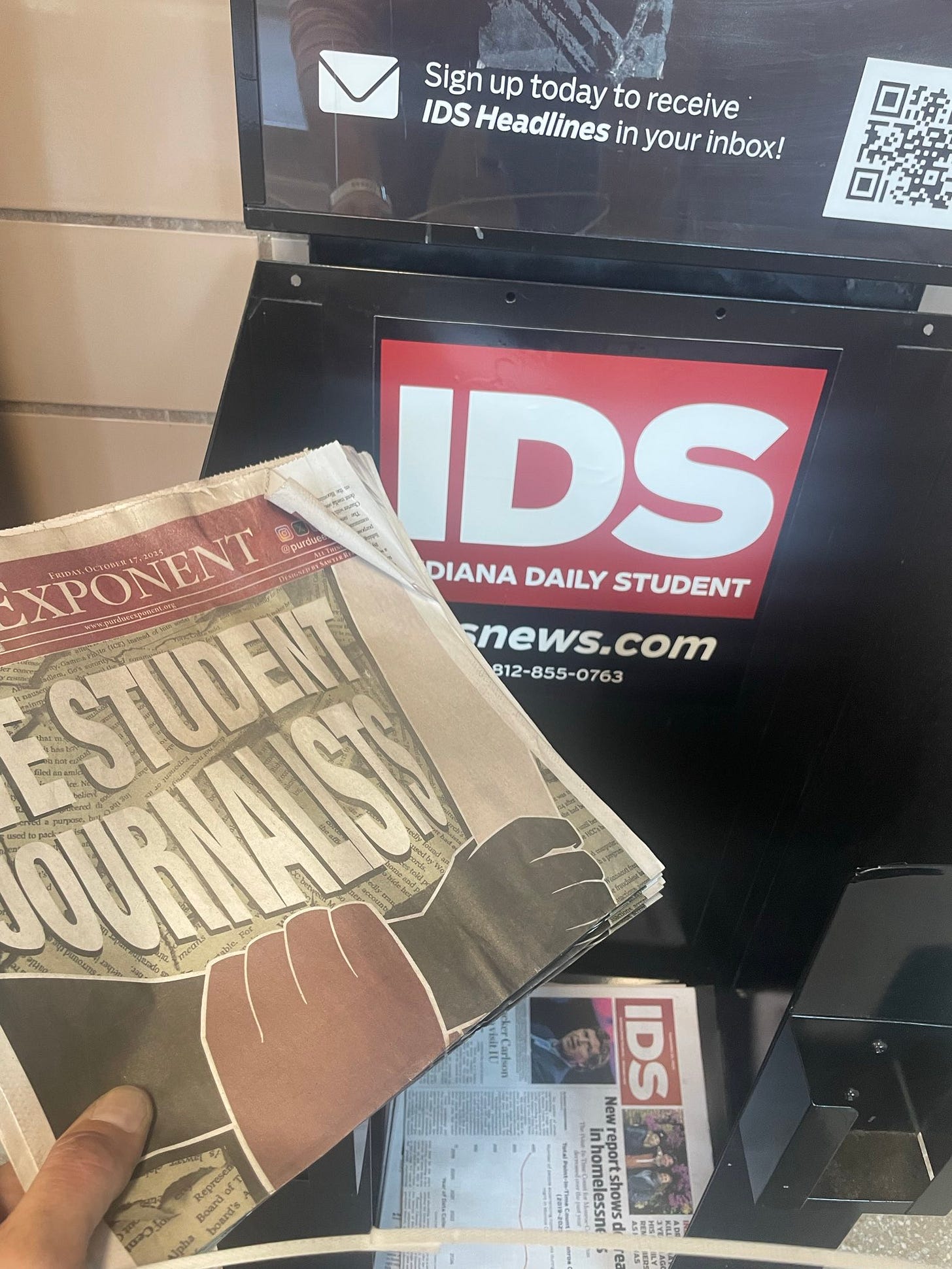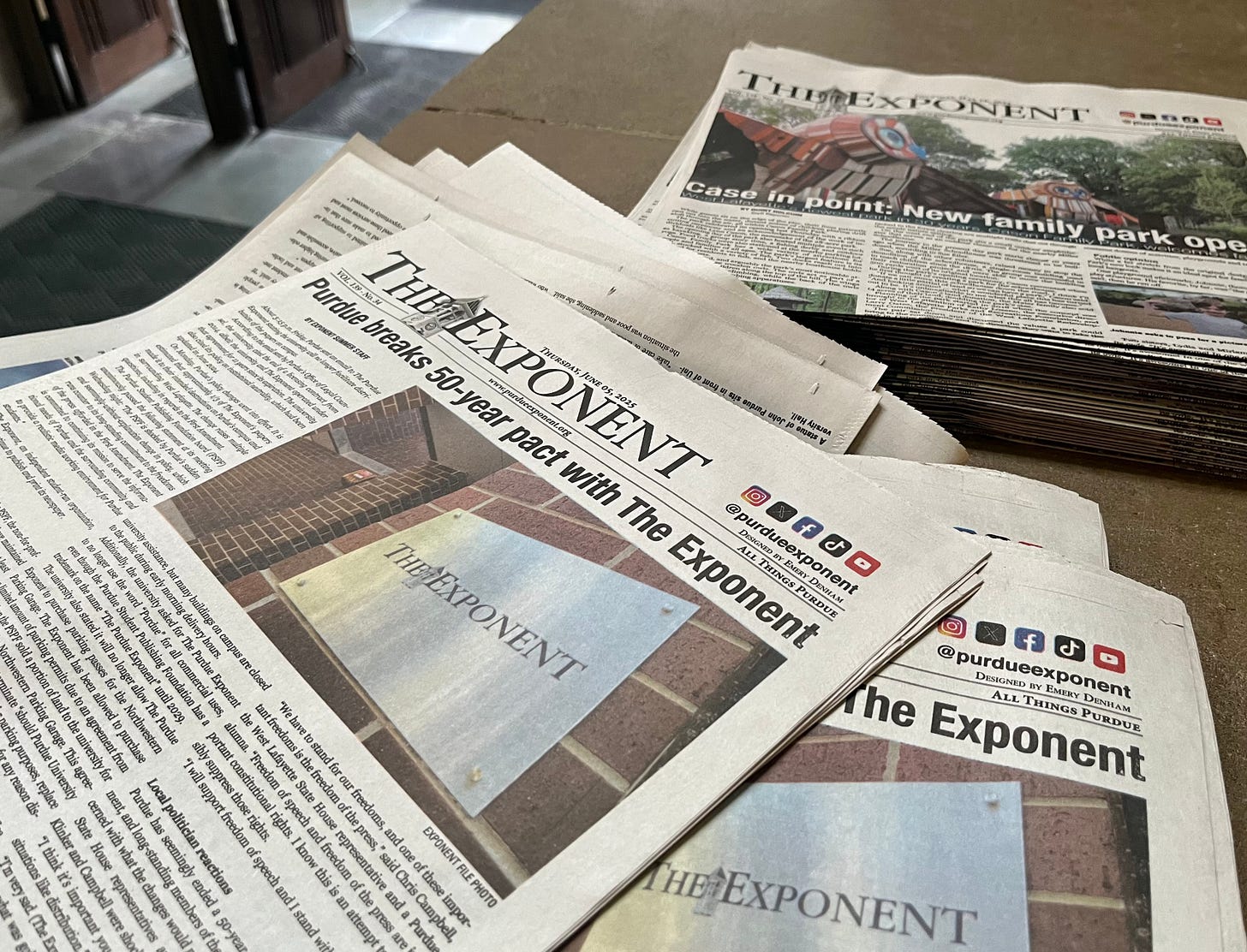Q&A: State of The Exponent, 4 months after Purdue distanced itself from the student paper
The Exponent inserted itself as a voice for student press as rival Indiana Daily Student was up against it. But where do things stand as the Exponent navigates its own rocky relationship with Purdue?
The folks at the Exponent, the Purdue student-run newspaper covering campus and the surrounding community, found themselves riding a wave in the past week as champions of the student press, inserting themselves as seemingly unlikely allies to the Indiana Daily Student, a paper at IU.
“It’s been kind of wild,” Olivia Mapes, the Exponent’s editor in chief, said this week, as calls continued from state and national outlets looking to tell the story about rivals helping a student paper in a fraught moment.
It went this way: After IU blocked the Indiana Daily Student from publishing a Homecoming edition last week – an administration decision that followed the firing of the IDS adviser who fought a university demand that the edition include no hard news stories mixed with the Homecoming coverage – the Exponent published a four-page “solidarity” issue to distribute on the Bloomington campus on Oct. 17. The angle made for great headlines across the country.
Things remain roiled in Bloomington, where the university administration continues to get blasted by fans of a free press and questions of the student newspaper’s independence and finances are about to get task force treatment.
Back in West Lafayette, the Exponent was already navigating its own rocky relationship with university administration.

On May 30, Purdue sent a letter to the Exponent, a student publication that dates to 1906 and that had been independent from the university since 1969, outlining the university’s decision to quit handling distribution of the twice-weekly print editions. That’s something campus employees had been doing as a courtesy without a formal contract for the past decade. The letter also requested that the Exponent strip the name Purdue from the publication’s masthead and online address “to avoid public confusion.”
As a kicker, Purdue pulled the Exponent’s access to university parking permits on campus.
University officials, after the Exponent reported on the letter in early June, declined to comment then on why they made the move when they did.
Instead they leaned on a statement that as an independent media outlet, the Exponent didn’t have a current contract for distribution on campus, so it was not “consistent with principles of freedom of expression, institutional neutrality and fairness to provide the services and accommodations described in the letter to one media organization but not others.”
The university did not respond to questions this week, either.
This week, Mapes and Exponent publisher Kyle Charters met at the paper’s offices on Northwestern Avenue, just across from campus, for a Based in Lafayette Q&A, discussing how the university’s move has played out for the Exponent and its student reporters four months later.
Question: To start with, how has this past week been for you? What the Exponent did to step up for the IDS has kind of blown up into a national story.
Olivia Mapes: Leading up to it, I just saw a post that their news adviser was fired. I thought I should write an editorial about this, especially thinking about how last year we wrote an editorial about how their print was cut and they had only special editions to print. Then we found out that their print was entirely cut and we learned more about the situation. So, we got in contact with them. We were just curious what they were printing, really. And then we were like, Hey, we have a printing press. Let’s offer it. We did, but they were scared of retribution – which I think is important to emphasize, with the times we are in, that that’s even a possibility, because who knows? I feel like 10 years ago, they might have gone for it. There might not have been as much chance of retribution. We still were wanting to do something. The idea of printing something and offering our support was so good that we decided to put together the whole paper. We had help from other papers. We got an editorial from the IDS. They gave us permission, which we really appreciate. We also have a partnership with the Campus Citizen, down at IU-Indianapolis, and that’s been great. More than that, I think it’s nice to have camaraderie with other student papers.
Question: Were you surprised it took off like it did, framed as you coming to a rival school’s aid? Did that enter your mind as you were going into this?
Olivia Mapes: I guess I didn’t really think about how people would react to the paper, other than we just needed to get it down there. We were thinking about how the (administration) would really react. But it’s brought people together beyond just the rivalry, and I think it’s been heartwarming actually to see that people support the free press.
Kyle Charters: To be honest, I didn’t even really think about what the reaction would be after Friday. And the reaction, as Olivia said, has been heartwarming, just to see people unite under wanting to support a free press. It shows you that even in our difficult times right now that there are still many of us who value the First Amendment and the ability for the press to tell a story and understand how it is one of the fundamental tenets of a healthy democracy. That’s been for us, I think – especially considering what happened with us at Purdue over the summer – a little bit of a relief to know that that’s the case.
We really just did it because we felt we had some kinship with the IDS because of what we’ve gone through and because of what it was going through right now. We felt that because of our independence, we are allowed a little more leeway than some other student media organizations, We own our press, and so we thought, let’s print it for them. And when that didn’t quite work out, we shifted gears and came up with another solution that I think was impactful also.
Question: You’ve talked about things you’ve gone through at the Exponent since this summer, when Purdue demanded some more separation. What has the fallout been this semester. That was June when this all started happening. We’re in October now. Tell me about those months.
Kyle Charters: Well, we’re still distributing a newspaper on campus on Mondays and Thursdays. Our estimation is that we’re diminished in terms of drop locations by approximately 30% on campus. But what we have seen for the most part is that the faculty and staff and students of Purdue value the Exponent. They value what we bring to the community. They value the First Amendment. They value honest journalism. And so the reaction from the people on the ground across the street has been overwhelmingly positive. That has been good for us.
SUPPORT INDEPENDENT REPORTING. SUPPORT BASED IN LAFAYETTE.
Question: How are you measuring that?
Kyle Charters: Just in our own personal interactions. That’s the major way. Maybe some social media interaction, too, I think you can judge from that. I’ll let Olivia talk to this a little bit more, but when they go and cover events, it is not uncommon for someone to say, “We support the Exponent,” to them. I think in advertising sales, as well, the community has rallied behind the Exponent. We sold a relatively major package a few months ago, and the person purchasing said, “I want to join the rebellion.” I think people, and Americans in particular, tend to like the underdog. I think in some ways, we still consider ourselves the underdog. I think it’s pretty safe to say that the Exponent, compared to Purdue University, is the underdog. And so people have supported us.
Olivia Mapes: You see Exponents still getting to their spots on campus. When I first saw that email (from Purdue), I was like, Oh no, they’re not going to get anywhere, because I wasn’t exactly clear on what they were changing. We can still bring them ourselves. It’s just that they’ve cut their part in the distribution.
Question: How have you done that to get physical copies where they need to go?
Kyle Charters: We haven’t changed much of our approach. Most buildings are locked overnight on campus, aside from five or so of them. But we have drop locations that we have dropped Exponents off at historically, and either the people who have previously moved Exponents from those locations into the racks are still doing so, or, in some cases, we think others have picked up who are supporters and are moving them to their racks. We’ve probably added 10 to 15 campus buildings and area business locations who have reached out to us since June 1 to add drop locations there. So, we’ve increased the number of locations on campus and the number of locations around West Lafayette. Where we’re not delivering anymore is to the (Materials Management Distribution Center), the Purdue inter-office mail.
Question: Since that letter in June, have you had any more conversations with university officials? Do you have any more clue about the “why now” of the university’s move?
Kyle Charters: We have had no communication further from my brief conversation with Steve Schultz after a Board of Trustees meeting in June. We’ve not had any other additional conversation and no answers in terms of why Purdue made the move that it made at that time.
Question: Have you made any other changes other than the distribution and drop-offs? I mean, your URL is still the same – purdueexponent.org – right?
Kyle Charters: Yeah. We haven’t done anything to make any other changes, aside from making efforts to get papers to other people who have requested them.
Question: Do you have plans to mess with the URL? That was a specific demand, or at least a request, from the university to remove Purdue from the online address.
Kyle Charters: Purdue made a request for us to do that. I’ll just say that we haven’t made any moves to do that at this time.
Question: When you go out and you’re interviewing people, do you say you’re with “the Exponent,” or do you say “the Purdue Exponent?” How has that changed the approach from when you started here to what you’re doing now?
Olivia Mapes: I wouldn’t say there has been a change in how I speak about the Exponent. I think I generally have always said the Exponent, but it’s still the Purdue Exponent. … I did make an effort to put in my editorial “the Purdue Exponent,” when I first mentioned it, just because we are the Purdue Exponent.
Question: Is there any long range plan to have to address these things? Or is it just kind of, let’s ride this out?
Kyle Charters: I’m just trying to get through tomorrow. I’ll just say again, as of now, we haven’t made any moves to change anything.
Question: Has it been weird being part of the news as opposed to just reporting the news?
Olivia Mapes: Oh, yeah. Because I’m used to asking the question then writing. It is very different being on the other end, having to answer the questions.
Kyle Charters: I never would have guessed 15 months ago that I would be doing this many interviews this side of the aisle. I don’t think we’re intentionally jumping into the news ourselves. We would prefer to be covering it. I think both Olivia and I would prefer to be the one asking you questions. But we do keep finding ourselves in this situation. With the IDS issue, I think we were simply trying to help the IDS and also raise awareness for student media. We didn’t necessarily anticipate that the reach would be quite as big as what it has turned out to be.
Question: About the relationship with Purdue, has that changed your approach? Do you feel it has changed how you’re able to report or changed how you’ve reported on the university?
Olivia Mapes: Less people are willing to talk to us, I’d say.
Question: In general? In terms of Purdue’s administration? Or all people on campus?
Olivia Mapes: The administration, yeah. Lots of students are worried about just having their name out there, just in these political times. Especially international students. I mean, it’s understandable that you wouldn’t want to be interviewed about things.
Question: Do you think that is a product of the times themselves? Is it a product of possible backlash of speaking one way or another about sensitive topics – say, Charlie Kirk’s murder, that sort of thing? Or is it backlash of university officials clamping down on what they say? What combination of that are you running into as a reporter and as an editor?
Olivia Mapes: I think you summed it up pretty well with these times. Because all of those things are a part of the current time. It all plays into each other, really. It’s connected with the administration being more silent. They are not willing to talk, even when we just want their perspective, and they stay silent on a lot of things. And yeah, the whole thing with what happened to Charlie Kirk, that’s a very big part of our current times and our current environment. It’s not just that Purdue. I don’t want to make it out like it’s a Purdue thing. It’s a nationwide thing, I’d say.
Question: Is this a time you wish you were tied to the university and not be independent? Or has independence been kind of a blessing?
Olivia Mapes: After the IDS stuff, I’m very happy I’m independent. It just shows how important it is. I think we’d have easier access to Purdue, but that doesn’t necessarily mean we’d be able to report on it how we wanted to.
Kyle Charters: For me, the issue with the IDS highlighted the great benefits we have of being an independent organization. We can tell the stories that we want to tell and nobody putting political pressure on us not to do so. As the publisher of this organization, it would feel like an absolute nightmare to have someone above putting pressure that you can or can’t say a certain thing. Our objective here is to cover the news objectively and fairly and from all angles and find the truth in stories. We hear a lot, as you do, and we’re trying to get to the bottom of things. Sometimes it would be nice if, you know, we got something back from Purdue. But in the current environment we’re in, it’s not just Purdue, a lot of people just aren’t wanting to talk these days. And there is sort of a chilling effect, I think, that everybody has sort of felt. You look at Stanford’s student paper suing Marco Rubio and the amicus brief filed by the Student Press Law Center coalition.
For context: The Stanford Daily Publishing Corp., which operates the Stanford Daily, sued the Trump administration in August 2025, arguing that attempts to detain and deport noncitizens lawfully present in the United States had made noncitizen journalists working at the student newspaper self-censor out of fear of visa revocation, arrest, detention and deportation, according to the Reporters Committee for Freedom of the Press. A coalition of campus papers led by Student Press Law Center on Oct. 15 filed an amicus brief in the federal lawsuit “to highlight the widespread chilling effect on student voices caused by recent immigration enforcement actions.”
Kyle Charters: They filed that brief on behalf of 55 others about the difficulty that Stanford and others filing that have had in talking, in particular, to international students because they’re scared to talk out of fear of some sort of retribution.
Question: You have written this semester about the fact that you are not able to hire international students, stemming from the university distancing itself from the Exponent. Is that still in play?
Kyle Charters: Yes, because we’re no longer a contracted vendor of Purdue, we cannot hire or even take volunteers who are international students. … It came to our attention in early September, basically at the start of the semester. We had to make that hard decision ourselves out of really wanting to not get international students into legal issues with their visas. That was the reason that we did what we did. We just couldn’t employ them.
Question: Have you had any other unintended fallout? The university was specific about what they didn’t want you to do with the URL, taking away available parking passes, and the rest. But were there any other unintended things that you didn’t see coming in June, that are landing this semester, manifesting since then?
Kyle Charters: Not really. I think that’s the biggest one. … We’re assuming that was an unintended consequence by Purdue, giving them the benefit of the doubt there. But it’s a big consequence. We have enjoyed getting the perspective of international students as our employees over the years, for sure. I think we’re definitely missing that now, especially in a time where you want to be able to have their voice in your newsroom. Not only from an ability to write stories, but also they’re good resources for telling us other things that are going on that we might not be aware of. If they’re involved in it, they might not be covering it, but we can assign it to another reporter to be able to cover. Now there’s the risk that we would be missing those stories that in the past we’ve known about because we’ve had an employee here who’s been aware of it.
Question: Hasn’t that always been Exponent’s strength on campus, having so many people on staff that you hear things from math classrooms or waiting in line for basketball tickets or whatever it is. That’s been the advantage on campus news, right?
Olivia Mapes: Yeah, just having so many people, especially having different backgrounds. I think it’s a misconception that you have to be an English major or something. No, it’s nice to have people from all sorts of majors. And then sheer amount of people have a lot of different ideas. They see things – maybe a poster on a street lamp – and it just happened to catch their eye, whereas I might have walked by. It does help to have tons of different people, different backgrounds.
Question: Has your staff changed at all in terms of numbers? Or did this situation with the university help, did it hurt or was it kind of a wash?
Kyle Charters: I don’t think we’ve seen any change in terms of more interest or less interest in the Exponent. With all this happening, in terms of specifically international students, we had to let four international students who were employees of the Exponent go. And then we probably had seven or eight who came to the callout who we had to discuss with them that that wouldn’t be an option – which made for some awkwardness, because you’re talking about a hundred people in a room and not wanting to single people out and tell them they weren’t welcome. That was uncomfortable, to say the least.
Question: How about in general, though? Has your overall staffing been roughly the same? Did you get anyone fired up to come and work for the Exponent because they wanted to stick it to Purdue over what happened this summer? Or was it the same sort of students who wanted to try reporting, coming in saying someone had told them it was a cool gig?
Kyle Charters: It’s been pretty much same. We haven’t seen anybody who’s specifically come in saying, I want to stick it to the man here, or anything. I think most incoming freshmen were sort of just vaguely even aware of what happened in the summer with us. So I’m not sure that that was really a factor.
Question: Do you see the Exponent being able to ride this out? Have the financials been OK? And is this just a momentary thing, where it will kind of fade away?
Kyle Charters: We’re doing fine financially. We’ve ridden this period out. And, in some ways, I think we’ve had a higher profile – people have rallied to say how much they appreciate the Exponent and what we do from a coverage point of view of Purdue and the surrounding community. That has been very positive for us to sort of have a higher profile, I think. …
I would like us to be able to have a healthy working relationship with Purdue. When we do things well, that’s good. When we do things that our students here, who are learning, need to improve upon and they let us know, that’s good, too. But there seems like there should be that sort of back and forth that would be healthy for us. Our mission here is to provide a real life workplace environment for Purdue students. That’s what we do. We provide a great service to the university that is unlike any other that you’ll find anywhere. Every semester we employ 100 students, teach them how to survive in a difficult environment where people aren’t always the friendliest to them. Where they can have successes like we did last week with the IDS special edition. Or where they could have mistakes that they learn from. But there are very few other places that do what we do – and do it for the benefit of Purdue students. And I feel strongly that that has been lost in all of this back and forth between the university and us – not even back and forth. All this back and no forth. That’s been lost that we do a good thing here for the community and for Purdue.
Question: Olivia, when did you start at the Exponent? What was your motivation?
Olivia Mapes: I started freshman year. Actually, when I toured Purdue, I saw an Exponent. I thought it was really cool. It’s an actual newspaper. Wow, that’s cool. Actually, it was one of the reasons I had for going to Purdue. … For me, and I think most people who are involved with the Exponent, it’s exciting. Every day is different. Who knew I would be doing this interview? I didn’t. That’s the exciting part. Then getting to meet different people, learning about different things, going different places that I wouldn’t have. It’s high stakes, and it’s fun. It’s just really interesting.
Question: What would be a good resolution for the situation that the Exponent is in now with the university? Or is the situation right now fine as it is moving forward?
Kyle Charters: I think we’ve always been willing to discuss ways in which we could re-establish terms that, in particular, would allow us to do to employ international students. We’re willing to have those conversations. There would be other things that would probably come with that, including our parking situation and distribution and stuff like that. But, to me, that international component is pretty important to us, and should be important to Purdue, too.
Question: Do you have any better sense of the tipping point that brought this on for the university, whether it was in terms of stories written or feathers ruffled in some fashion?
Kyle Charters: We don’t have anything more now than we did. Purdue wants to make it be a contract issue. We disagree that it’s simply a contract issue. It seems unlikely that Purdue just woke up and discovered that we hadn’t been under contract for 11 years. There had to be something that spurred its decision, but we don’t have any other idea of what that would be at this point.
Question: Did it have anything, do you think, to do the fact that the Exponent wrote about scrubbing its reporting of names of students who participated in the pro-Palestinian encampment on campus in 2024? (See: “EDITORIAL: Pro-Palestinian students are under attack, so we’re removing their names,” Exponent, Feb. 6, 2025.) After that was picked up in national media, it seemed like the university was looking to distance itself then. (The university issued a statement after that editorial that the Exponent was unaffiliated with Purdue.)
Kyle Charters: I think it’s a very good question that you ask, and you have the timeline correct there on us writing that and Purdue then releasing a statement separating itself further from us or making sure that national media was aware that the two entities weren’t related. That came about in early- to mid-February. Then a few months later, Purdue sent notice to us.
Question: But no other things that would have been hidden from everyone else outside the situation that you know of that were friction points with Hovde Hall?
Kyle Charters: No. And if there were, we would love to know.
Question: How are you going to finish out the semester? It’s been quite a ride from June until now.
Olivia Mapes: Just keep chugging along, I guess. We’ve got stories we’re working on. Take every day as it comes, really. You never know what’s going to happen – as you can see.
Kyle Charters: Yeah. I mean, our last our last week turned very different than what we anticipated it being. For me, those are the cool days in the news business, when the adrenaline gets going a little bit and there’s breaking news or something happening that you’re changing gears and everybody’s involved and it’s a team atmosphere and you’re putting together a product and you get to see that product finish the next day. In this case, it got a lot of regional and national publicity. Those are the days that we sort of live for. You never know when those days are going to come. But our objective to finish out the semester is to continue to tell the story of Purdue and West Lafayette. Tell the good stories, tell the critical stories. Do it the best way that we can.
For more: The Exponent is offering copies of its special edition in support of the Indiana Daily Student for donations of $25. Of that, $10 from each copy will go to the IDS. For details, here’s a link.
Thank you for supporting Based in Lafayette, an independent, local reporting project. Free and full-ride subscription options are ready for you here.
Tips, story ideas? I’m at davebangert1@gmail.com.






Proud of Olivia, Kyle and the Exponent staff. Keep up the good work and stellar example of America’s founding ideals of freedom of speech and boosting the underdog. —Angie
An outstanding edition, Dave! The Exponent and the IDS are crucial vehicles for keeping students attending their universities and the communities at large informed and in tune with each other. My kudos to their staffs for their tenacity in defending freedom of the press and the ethics of that role. Another thank you, Dave, for a deeper insight and the link to help both papers out.